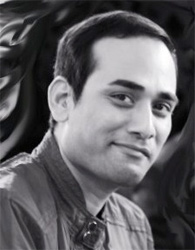Anshuman Das is well-known (generally as AD) in Hong Kong’s LGBT community as a great campaigning activist: Coordinator of the first Hong Kong Pink Season in 2011, Director of the annual Mr Gay Hong Kong pageant, webmaster and coordinator of communications for the Pink Alliance, leader of the diversity group at Bank of America Merrill Lynch and one of the leading lights of the Hong Kong Interbank LGBT Forum. In fact, almost everywhere you look in Hong Kong’s LGBT world, you’ll find him, towering at 6’2” over everywhere else in this town where most people are under 5’8”.



In 2011 he brought out his first novel, a work of gay love set in Hong Kong and Shanghai, Memory of a Face (which he published himself online). Now he has hit both the web and the press with a new autobiographical work of love and loss, Always Forever which was launched in Hong Kong in June. Sales of Always Forever has since raised HK$5370 (US$690) towards flood relief work in Manila.
The book is an unusual one; the true story of a love affair, which, all-too-short, ended with the death of his Filipino boyfriend, Mike Francis Mendoza who is also known as Mikee, hundreds of miles away in a hospital bed in Manila. It’s the tale of how AD came to know Mikee, who was a singer, song-writer and performer whom AD met at the Mr Gay World contest in Manila in 2011. More than this, it’s the story of how AD came to know Mikee better after his death than he had time to do before it, how he coped with his loss and how it has transformed and inspired his life. So AD wanted his launch to be like no other and asked his guests to imagine that they were meeting the characters of his book in person. He wanted them to feel the emotions and see first hand some of the insights he had found. This could have made the launch a very sad event, but it didn’t, as he mirrored it on the Filipino way of mourning their loved ones, not a grey, sad, mournful ritual, but a joyful commemoration of a vibrant, happy and loving life by all those it had touched. So the launch was electric, glitzy and fun, a high, not a low, vibe. Tony sat down after the guests had gone to find out more from AD about the story behind the event.
Everything had just happened so suddenly, AD said. He’d never had any intention of writing a book about himself or his own life. It all began when he was setting about promoting his first book, Memory of a Face, which was making money for charity. He saw the opportunity when there was a call to help with voluntary work for Mr Gay World in Manila. He signed up for it, and at almost the first event he went to there, he saw a guy and fell in love. This was Mikee, a man with a happily raucous extended family and wide group of friends, a good looking guy and someone himself known as a former contestant in Mr Gay Philippines, an artist and an activist and a beautiful man.
Mikee followed AD back up to Hong Kong after the event, and they spent a few days together there, but what neither of them knew was that the illness that had begun to affect Mikee would be terminal, and when he got back to Manila, he went almost immediately into hospital. When AD realised that Mikee was no longer responding to his calls and texts, it was too late. Mikee had died. AD was devastated. He could not have conceived before that, in such a short amount of time, the impact of somebody could have been so intense. Nor could he have imagined that the changes that it brought to his life could have been so substantial. “Recreating our scenes together when I wrote was painful, really, really painful, ‘cos I had to remember each and every expression and what we discussed and talked about then and put them down into dialogues,” AD said.
"I promised him a few things and one of them was to write a book about hi,” he added. “I found myself in love with him even more after his death. Through writing this book I found more and more things about him.” Now, AD can look past the sadness and see Mikee entering his life as a positive sign. Mikee’s death brought many precious people into his life and it opened his eyes to see almost everything differently.
Writing about your own life can be hard for any of us, but writing about recent pain and loss takes a lot of courage. Admitting truths which you might not want to reveal to others is even harder. AD has deliberately done this in Always Forever, both as an act of personal catharsis and to help others going through what he has suffered.
While he was writing the book, he managed this by conceiving it all as a learning process: “While I was writing the book, I realised how connected we were and how many different things I had learned from Mikee’s life. Mikee had a huge attachment to his family whereas I’m the opposite, which is something I am working on now. Even though I wrote about this experience, I haven’t finished learning from it yet and am still trying to learn from it and work my way through it. Writing this book was not just about sharing the story, it was also about healing myself, improving myself.”
AD explains his dilemma as a writer of describing a tragedy without burdening the reader with the sense that he is seeking for sympathy. So in the book he is uncomfortably honest in describing his own reactions to the different stages of pain and grief. Always Forever has such a naked voice, that the reader cannot evade its personal demands.
AD has inserted a series of poems to reflect these stages of feeling as markers to break up the text. He found his inspiration for this while he was at Mikee’s funeral and memorial service, where he met almost 1,000 people in three days, all paying tribute to Mikee in different ways, some making collages, some writing poems.
From writing fiction, the jump into autobiography was a totally unexpected one, but as a work of autobiography the book has considerable value, for it tells of the key LGBT events that took place in Hong Kong over the few years it covers. Yet this was incidental to AD’s intent. He commented: “In the future, if I am going to write something new, I want it to contain a message. My first book, my novel, was about letting go. Sometimes we hang on to bad relationships, bad experiences, bad memories. If we are able to let go of these things, we’ll be ready for other things to come into our lives. This new book is about love and death. I am not sure whether I will continue with this story now; it’d have to be written from a different angle and with much deeper meanings.”
It is remarkable that, amidst doing all the things AD does for other people, he found time to love, to mourn and yet to gather himself to write about his experience. It is an inspiration.
Both print and e version are available online. For more information on AD’s latest book Always Forever, visit www.anshdas.com.
